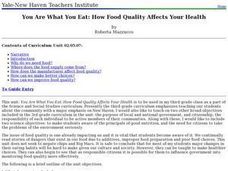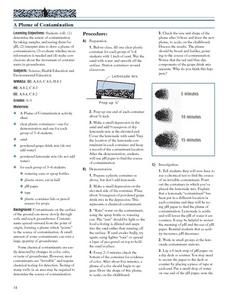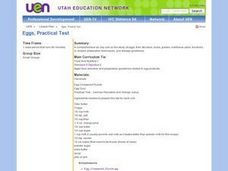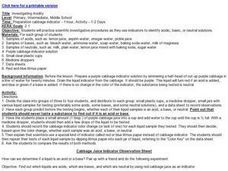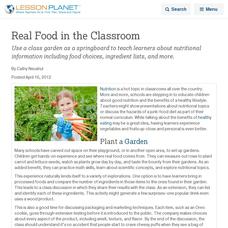Curated OER
Diet: You Are What You Eat
Third graders examine the issue of food quality to assess the dangers of pesticides, additives, and improper food preparation. After keeping food diaries and categorizing foods, they fill in food pyramids based on their journal entries....
Curated OER
Test Your Patience: Nonsense Quiz
In this testing patience worksheet, students read through the quiz that doesn't make sense. Students then try to answer the 20 questions to taste their patience.
Washington State Department of Health
Let's Cook!
Recipes, tasting activities, images of fruits and veggies, fun food facts... you name it, this resource has it! Your class will be cooking up wonderful dishes in no time with these materials. Included here are recipes, handouts,...
Virginia Department of Education
Acids and Bases
What did one titration say to the other titration? We should meet at the end point! Young chemists perform four experiments: dilute solution, neutralization, titration, and figuring pH/pOH.
Polar Trec
Animal Monitoring Introduction
Not only do mealworms taste great, they are also great for classroom science lessons. In pairs, young scientists observe and record what they see as they check out what their mealworms are doing from minute to minute. Each minute...
It's About Time
Identifying Matter
High schoolers test wood splints that have been soaked in mystery solutions to identify the different colors it produces when lit. The lesson concludes with a reading passage and analysis questions.
Curated OER
Population Study and Applications Using PTC Paper
Students study human population traits. In this science lesson plan, students gain an understanding of the terms dominant, recessive, haploid (monoploid), diploid, genotype, phenotype, scientific sampling, and scientific modeling as they...
Teach Engineering
Clay Boats
Clay itself sinks, but clay boats float. Why? Young engineers build clay boats to learn about buoyancy. They test the weight the boats can hold using washers and then tweak their designs to make improvements, following the engineering...
Curated OER
A Plume of Contamination
Young scholars perform an experiment/investigative simulation regarding the movement of contaminants in groundwater. They test the pH of three water samples, and then use their reasoning skills to determine the source of an invisible...
Curated OER
Fish
This short activity, with a reading passage and questions, could be part of a test preparation activity. Through answering the 10 questions students practice comprehension and vocabulary skills.
Curated OER
Minnesota-China Connections: Chinese Flavors
Students discuss the foods which are typical of a Chinese diet. They find recipes and observe and sample various Chinese foods. They record their opinions about what they taste and experience in a journal entry.
Curated OER
What's Cooking?
Students investigate solar energy by making sun tea. In this ecology and solar energy instructional activity, students prepare traditional tea and "sun" tea, then record and graph data comparing color, clarity, smell and taste.
Curated OER
Reading Vocabulary - 1
In this vocabulary test worksheet, 2nd graders read the words and select the meaning from the options. Students complete 8 vocabulary sentences.
Curated OER
Eggs, Practical Test
Third graders explore the structure, size, grades, nutritional function, preparation techniques and storage guidelines of eggs. They prepare German Pancakes and Orange Julius.
Curated OER
Lesson Plan Seven: Sensorama
Learners identify five senses, and use their senses of touch, sight, hearing, smell, and taste to distinguish different objects, sounds, smells and tastes, and write their answers in the booklet.
Curated OER
Healthy Water!?
Students test water for its quality and record their information.In this water quality instructional activity, students investigate water for pH, macro invertebrates and identify its characteristics. Students complete worksheets on their...
Calvin Crest Outdoor School
Survival
Equip young campers with important survival knowledge with a set of engaging lessons. Teammates work together to complete three outdoor activities, which include building a shelter, starting a campfire, and finding directions in the...
Virginia Department of Education
Acid-Base Theory
Litmus paper, why so blue? A chemistry lesson includes a pre-lab activity, practice calculating pH, an experiment measuring the pH in acids and bases, a titration demonstration, and a titration experiment.
Virginia Department of Education
Using Specific Vocabulary and Collaboration
Develop concepts on how to change your improving wordsmiths' writing from blah to wow with the activities and ideas in this resource. The instructor provides the class with examples of writing that lacks detail and precision, and then...
Curated OER
Investigating Acidity
Learners classify liquids as an acid, base or neutral. They use purple cabbage juice as an indicator to test several liquids in order to group them as acids, bases or neutrals.
DiscoverE
An Egg-Citing Ride
Wheeeee! Young thrill seekers build a bungee jump—not for themselves, though, but for an egg. The egg must fall from a height of five feet and rebound within two inches of the ground or floor.
Curated OER
Sour and Bitter: Acids and Bases
Tenth graders distinguish between acids and bases. In this pH instructional activity, 10th graders view a PowerPoint and discuss the characteristics of an acid and a base. They investigate natural substances to determine the pH level of...
Curated OER
Real Food in the Classroom
Use a class garden to teach learners about real food, nutrition, and more.
Curated OER
Food & Science - How Healthy is Your Diet?
Learners experiment with various foods to determine fat and starch content. They rub jam, peanut butter, bananas, and other foods in a small circle on a piece of paper, and observe the results. If there is a high fat content in the...


